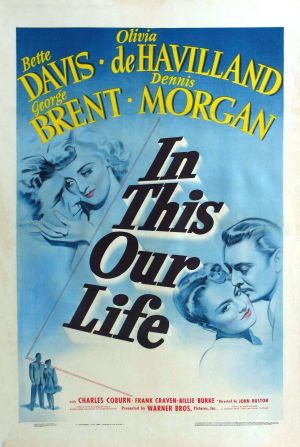
IN THIS OUR LIFE
US, 1942, 101 minutes, Black and white.
Bette Davis, Charles Coburn, Olivia de Havilland, Frank Craven, George Brent, Dennis Morgan, Billie Burke, Hattie Mc Daniel, Lee Patrick, Walter Huston.
Directed by John Huston.
In This Our Life is an excellent melodrama from the early '40s, written by Howard Koch, it was the second film directed by writer, John Huston (after The Maltese Falcon). Huston was to continue a successful directing career for over forty years, winning an Oscar for The Treasure of the Sierra. Madre. (his father Walter Huston has an uncredited guest role as a barkeeper in this film.)
The film is also a star vehicle for Bette Davis and Olivia de Havilland as contrasting sisters - ironically with the names of Stanley and Roy. Dennis Morgan and George Brent are very good in the subordinate male lead roles. However, Charles Coburn is a scene-stealer as a doting old uncle - he was to win the Oscar for Best Supporting Actor the next year for The More the Merrier. Frank Craven and Billie Burke (a contrast from her more jolly flighty roles) are excellent as the women's parents. There is a lush Max Steiner score.
The film has constant reference to civil liberties, radical views and social concern. One of the main characters is a black American who aspires to be a lawyer - the screenplay contains strong wit - hopes for success in a legal career. In the portrayal of race relationships, the film is ahead
of its time.
1. An entertaining melodrama? Far-fetched - but well-constructed and acted? Audiences response - suspending disbelief? The popularity of this kind of Bette Davis melodrama in the 1930s and '40s?
2. Warner Bros production values: black and white photography, the atmosphere of the situation? The lush musical score? The stars and the strong supporting cast?
3. The melodramatic and earnest title? The references to the various characters and the meaning of their lives? Happiness? Unhappiness?
4. The portrait of American families? The older generation - and the references to their spoiling their world? The contrasts with the younger generation - and the criticisms by the older (perennial criticisms!)? The big firm and the stronger brother taking over the weaker brother? The struggles within families? Power, money? Happiness and unhappiness? The emphasis on strength and guts? The condemnation of weakness - though the shallowness of the so-called strong?
5. Stanley as the focus of the story? Her wilfulness, her tantalising her doting uncle, getting money from him? Her place in the house, her mother doting on her - even prepared to lie for her after the accident? Her father seeing her weaknesses? Roy and her support? The stealing of Roy's husband? Going off with Peter, setting up house, her buying the gramophone, her wilfulness, the marriage, the night and the nightclub, with Petty, tormenting Peter, getting more exasperated with him, the impact of his suicide? Her not wanting to blame herself? Coming home with Roy? Wanting everything from her uncle, his not giving it? Her scheme to entice Craig back? The clash with Roy? The waiting at The Shanty? Her speeding, the hit-run? Her blaming Parry? Her lies, thinking that Parry would get off with money and legal help? Confronting him in the jail? The confrontation by Craig, Uncle William and his preoccupation with his illness? Her wilful driving and death? A melodramatic performance of a highly stylised character - wreaking havoc-about her?
6. The contrast with Roy and Olivia de Havilland's more demure style? Love for Peter? Coping with his leaving her? Her determination to be hard - unlike her father? Put not becoming hard? Her friendship with Parry and support of his work and hopes? Her concern for him when the accusations came? The visit to Minerva? The friendship with Craig, the getting to know each other, depend on each other? Her tentativeness in relating to him? The vindication of her trust and love?
7. The uncle, the portrait of a doting uncle, wilful, angry with Stanley, forgiving her, wanting her to live in his home, preoccupied with his six months to live? His overriding his wife? His gaining his brother's money? His conservative views? Capitalistic? Craig standing up to him? The portrait of the older generation?
8. The contrast between Peter and Craig? Peter and his love-for Roy, his work in the hospital, going off with Stanley, his work, infatuation with her, worried about her wilfulness, drinking, suicide? Craig as the upright lawyer, seemingly unimaginative, hurt by Stanley, devoted to Roy, his liberal causes, his not believing Stanley and confronting her?
9. Asa and Lavinia? Asa as a good but seemingly weak man? His concern about his daughters? His wife's hypochondria? Her self-preoccupation, emotional outburst about Stanley?
10. Petty and her friendship for Stanley, sharing her extravagance, handling the crisis situation?
11. Parry and his work in the house, the cars, his legal hopes, the opportunity with Craig, the accusation, his being in prison, the seeming hopelessness? Minerva and her telling the truth? The importance of the treatment of black-white relationships and black aspirations in a 1942 film?
12. Melodramatic themes of relationships? Social comment on America in the early 20th century?